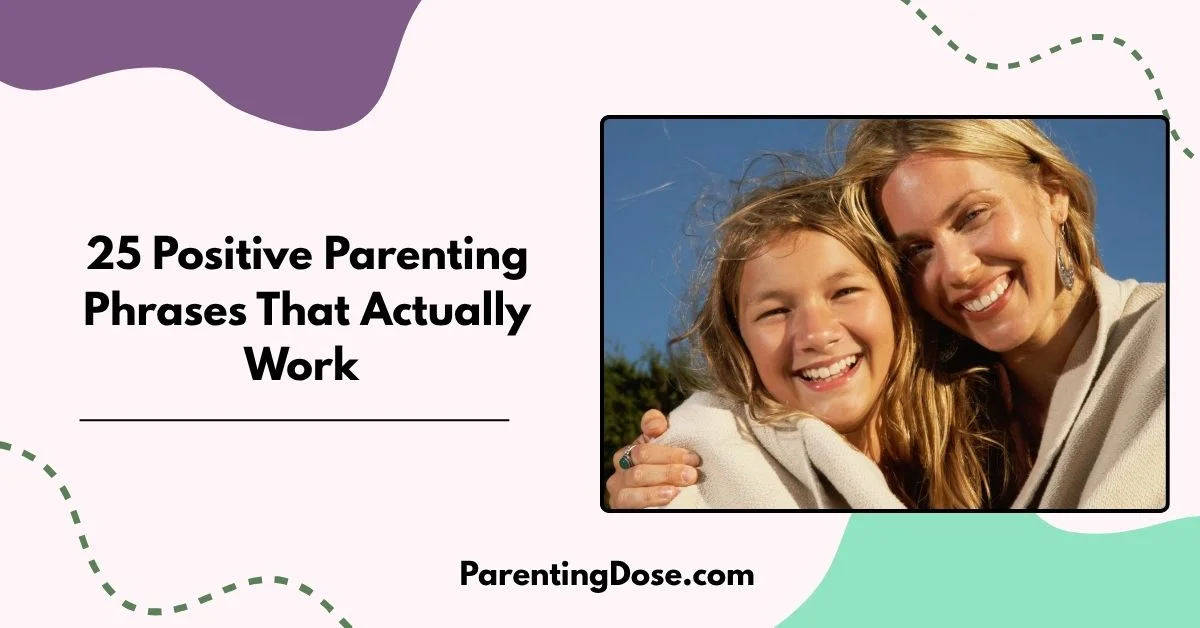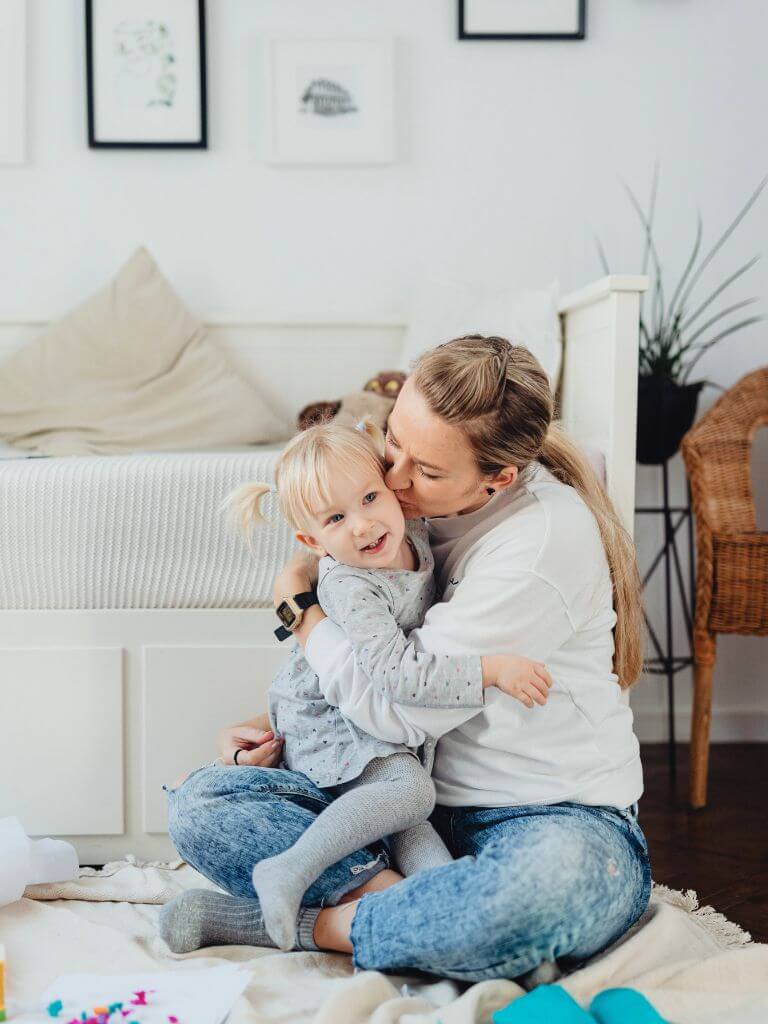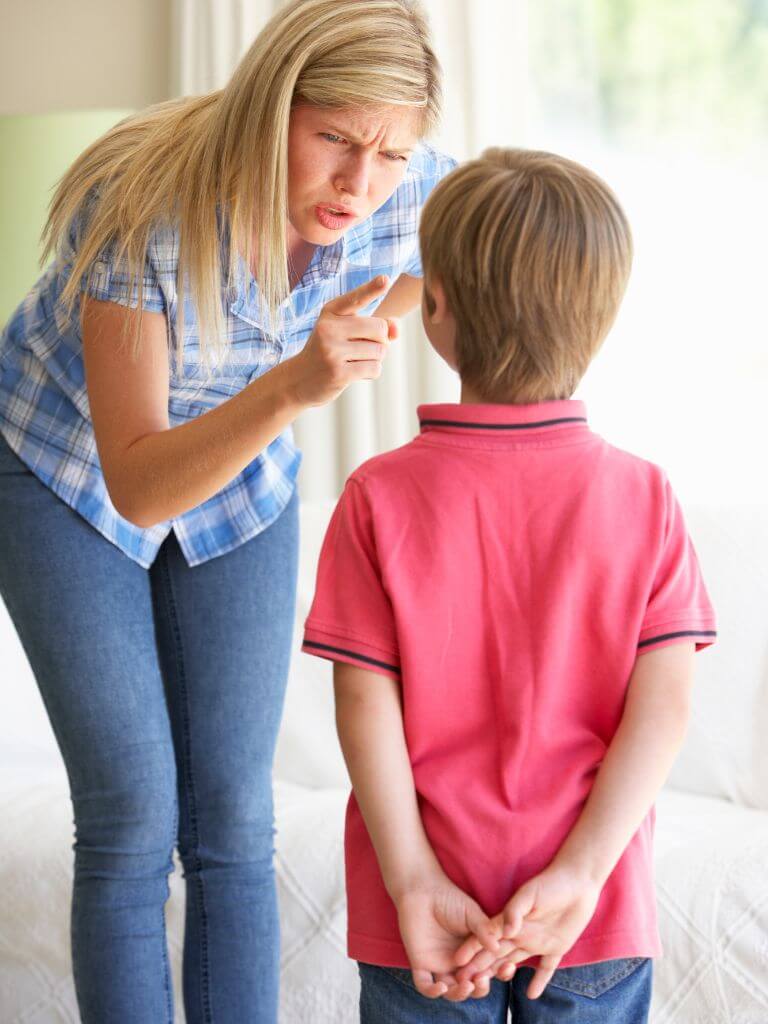I still remember the day I snapped at my 3-year-old in the Target checkout line.
He was melting down over a toy he couldn’t have, and I—already running on zero sleep and caffeine fumes—heard myself bark, “No! I said stop it!”
The look on his face gutted me.
He wasn’t being bad. He was overwhelmed. And honestly? So was I.
I got in the car afterward and cried. Not because he didn’t get the toy—but because I didn’t handle it how I wanted to.
If you’re a mom navigating the daily chaos of toddler tantrums, bedtime negotiations, and the emotional rollercoaster of raising kids in a gentle, positive way—without becoming a doormat—you’re in the right place.
This post is a deep-dive into real, powerful, emotionally attuned positive parenting phrases you can use every day—phrases that encourage, guide, calm, and empower your child without losing your sanity.
Why Positive Parenting Phrases Matter (Especially When You’re Burnt Out)
Here’s the thing: our words become our child’s inner voice.
That sounds beautiful and terrifying all at once, right?
When we respond with connection instead of control, we’re not just de-escalating a moment—we’re teaching emotional intelligence, resilience, and self-worth.
And no, this doesn’t mean being perfect. It means being intentional.
Positive Parenting Phrases to Encourage Toddlers
Toddlers are tiny hurricanes with big feelings. They need encouragement that matches their stage—simple, clear, and full of heart.
Try these:
- “You worked so hard on that!”
→ Praises effort over outcome. Perfect for when they’re stacking blocks or trying to zip a jacket. - “I see how much you wanted to do it yourself!”
→ Validates their growing independence. - “You’re getting stronger every day.”
→ Builds confidence in their abilities. - “I love watching you learn.”
→ Focuses on connection, not perfection. - “It’s okay to try and not get it right.”
→ Teaches them that mistakes are part of growth.
Positive Parenting Phrases for Discipline (That Don’t Break Their Spirit)
Discipline doesn’t have to feel like punishment.
It’s about teaching, not shaming. Try these instead of harsh commands:
- “Let’s try that again together.”
→ Offers a redo and models patience. - “I won’t let you hurt anyone. Let’s find a safe way to be mad.”
→ Sets a boundary while validating emotion. - “I know it’s hard to stop. Would you like help or a minute alone?”
→ Gives choice while redirecting. - “It’s okay to feel mad. It’s not okay to hurt people.”
→ Separates emotion from behavior. - “I hear you. Let’s talk about it when we’re both calm.”
→ De-escalates without ignoring.
Positive Parenting Phrases to Calm an Upset Child
When your child is in meltdown mode, they need safety and softness—not lectures.
These phrases create connection in the storm:
- “You’re safe. I’m here with you.”
→ A grounding mantra during tantrums. - “Your feelings are okay. Let’s breathe together.”
→ Models regulation. - “This is hard right now, isn’t it?”
→ Helps them feel seen, not judged. - “I won’t leave you. We’ll figure it out together.”
→ Combats fear of abandonment and teaches co-regulation. - “I love you even when you’re upset.”
→ Powerful, healing words every child needs.
Sometimes, your calm is more powerful than any fix-it phrase.
Positive Parenting Phrases to Say Instead of “No”
Let’s be real—saying “no” 1,200 times a day wears us down. And hearing it constantly wears them down. Here’s how to redirect behavior without always defaulting to the negative:
- “That’s not safe. Let’s try this instead.”
→ Prioritizes safety without shutting down curiosity. - “I can’t let you do that, but I can help you with this.”
→ Reframes the boundary. - “I see you want to jump on the couch. Let’s jump on the floor instead!”
→ Meets the need in a safer way. - “We’re not doing that right now, but we can later.”
→ Helps manage disappointment. - “Let’s make a different choice.”
→ Teaches problem-solving over power struggles.
It’s not about never saying “no”—it’s about using words that teach, not trigger.
Positive Parenting Phrases to Build Child Self-Esteem
Self-worth starts with us. The way we speak to our kids becomes the way they speak to themselves.
Use these:
- “You are kind and brave.”
→ Simple, powerful identity builders. - “There’s no one else like you—and that’s amazing.”
→ Celebrates individuality. - “I’m so proud of who you’re becoming.”
→ Reinforces growth and integrity. - “You don’t have to be perfect. Just be you.”
→ Counters performance pressure. - “You are enough. Always.”
→ The most healing phrase of all.
These phrases become their mental armor in a world full of comparisons.
Positive Parenting Phrases to Use With Teenagers
Teens need connection just as much as toddlers—but they’re less likely to ask for it. And yes, they can be prickly but they still need to feel loved, heard, and guided.
Here are phrases that build trust (without sounding like a lecture):
- “I trust you to make good choices—and I’m always here if you need help.”
→ Communicates belief and support. - “I know growing up is hard sometimes.”
→ Offers empathy without minimizing their struggle. - “Tell me more—I really want to understand.”
→ Opens the door for honest conversation. - “You can always talk to me—even if you think I’ll be upset.”
→ Builds safety for vulnerability. - “You’re doing better than you think.”
→ A lifeline when they’re feeling lost.
Final Thoughts: You Don’t Have to Get It Right Every Time
Mama, I know what it’s like to feel like you’re doing everything wrong. To go to bed replaying all the moments you wish you had responded differently.
But here’s the truth: you don’t need to be perfect to raise kind, resilient kids.
You just need to be present. And intentional.
Using positive parenting phrases doesn’t mean being soft or permissive.
It means leading with empathy and modeling the kind of emotional intelligence we want our kids to grow into.
So next time your toddler is throwing spaghetti or your teen is slamming doors, remember—you’ve got tools now. Gentle, powerful words that build bridges instead of walls.
And when you mess up? Apologize. Repair. Try again.






